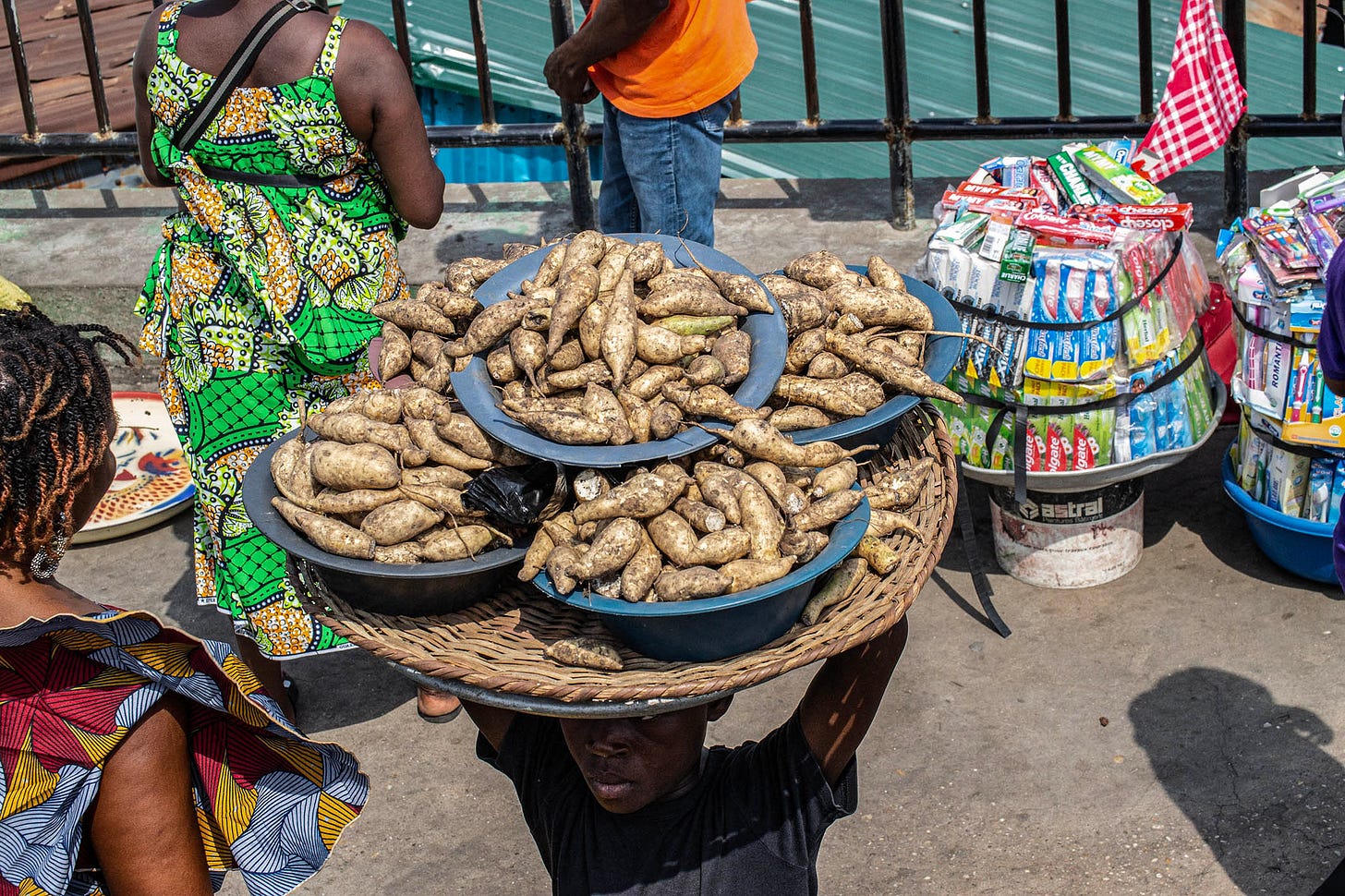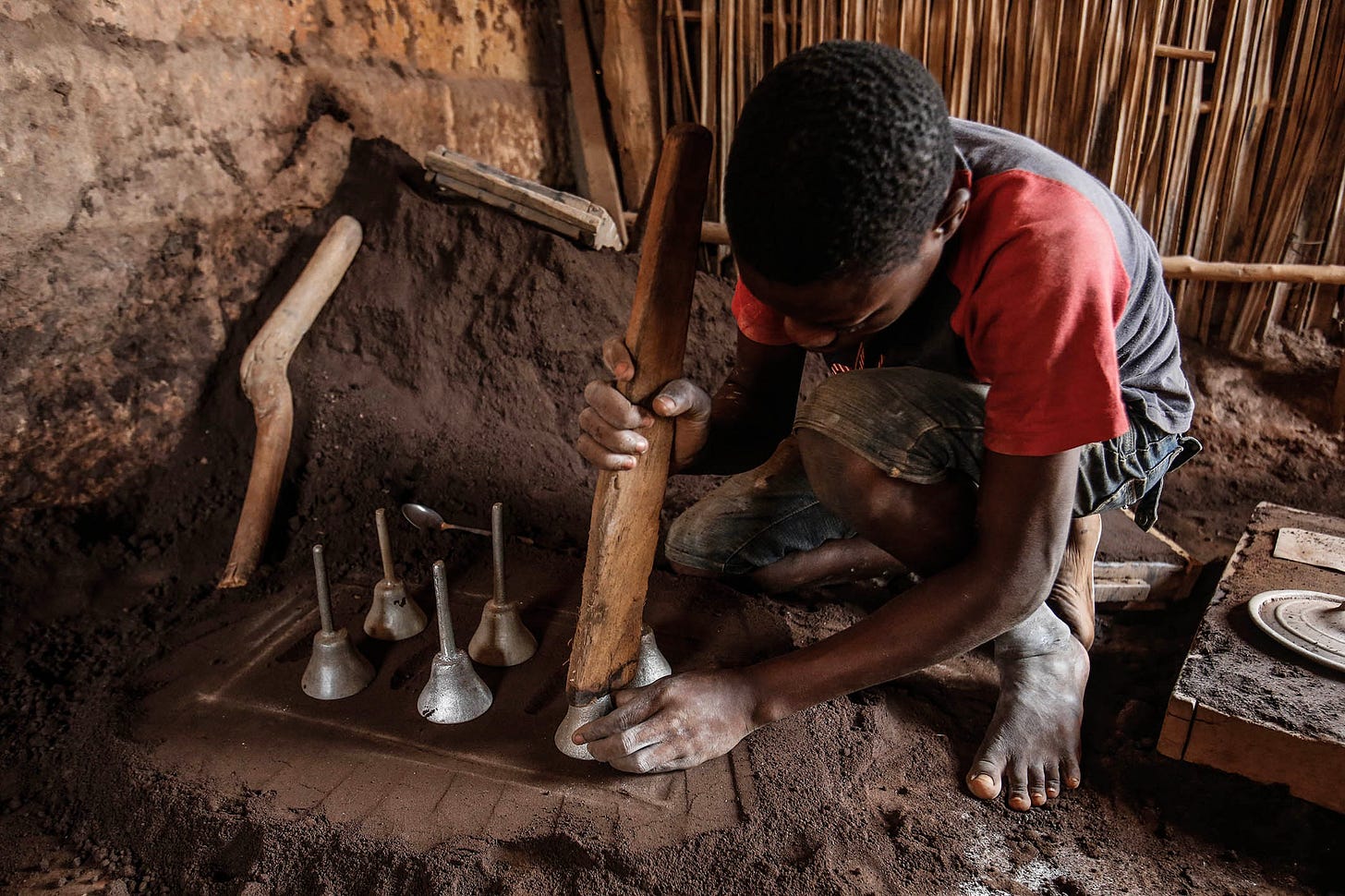This is not child’s play
Child labour is deeply entrenched in Benin – and the problem cannot just be legislated
Issa Sikiti da Silva in Cotonou

A child carrying a big basin of tomatoes for sale in Cotonou’s Dantokpa Market falls unexpectedly near one of the city’s many polluted and stinking streams.
Torn between the pain in her leg and arm, and the sight of passing vehicles crushing her tomatoes, she burst into tears. “My mother is going to beat me hard for wasting her tomatoes,” she tells the passers-by who stop to offer help.
“What kind of a mother sends her kid into such sweltering heat with a huge basin of tomatoes on her small head,” an onlooker wonders aloud. Not a particularly unusual kind of mother, in Benin and its neighbouring countries.
Not far from where the nine-year-old girl fell, a 10-year-old boy is working as a mechanic’s “intern”. He struggles to carry the huge tyre the mechanic has ordered him to repair. “It is too hot and I am hungry and very tired,” says the emaciated boy. “This tyre is too big to carry.”
Elsewhere in the city, an 11-yearold orphaned girl explains the child labour system in the group home where she sleeps. She says she and the other children there often work from 6am to 3am the next day. “We start with house chores, then move to washing clothes and cooking,” she says. “In the afternoon we sell cooked food along the main road. We finish around 3am and go home to sleep for a few hours.”
Those aged 14 and above earn around 700 CFA francs (around $1.15) per day. “The boss says I’m too young to get a salary,” the girl says. Instead, in return for her labour, the girl gets some food and a place to stay. But if she were to fail at it, “the lady will beat me up and could even send me away. Where would I go?”
Estimates of the prevalence of child labour in Benin range from 37%, according to the International Labour Organisation to 52.5%, according to Unicef, the United Nations Children’s Agency, which says 40% of working children are in dangerous work like cotton and crushed granite production.
“These figures date back to 2018. I’m afraid the situation might have worsened during the Covid-19 pandemic due to poverty,” says Alfred Amoussou, a schoolteacher. “It breaks my heart every time I see them suffer. Their place is at school, not in these homes, markets, shops or farms.”
“There is at least one child in every house or shop across Benin working in very difficult conditions, many without pay and experiencing abuse from their bosses,” says a community leader in Cotonou – who requests anonymity because Beninese government workers are often punished for making public comments without permission. “They come from all corners of West Africa: Togo, Burkina Faso, Nigeria, Niger, Côte d’Ivoire and even Mali,” she explains.
Good laws, little result
Technically, it is illegal to put children to work in Benin. The Constitution makes primary school education free and compulsory. The labour codes sets the minimum working age at 14 years for general tasks and 18 years for hazardous work, and prohibits forced labour. The child code prohibits child trafficking, a common precursor to child labour and exploitation.
But, by and large, the government “is failing to enforce its own laws,” according to a government source who asks not to be named, fearing reprisal. They say the government is reluctant to address the issue because many well-off people have children working for them in their farms, shops, factories and homes.

The practice is also deeply entrenched in the country’s culture: in a traditional practice known as vidomégon, children are often sent to live with and work for relatives in exchange for things like school tuition. “It is not child labour. It is training for manhood and womanhood,” Elisabeth Dossou chuckles. She’s 70.
Dossou explains: “Unlike children coming from rich families, we prepare kids from poor families through hard work, to make them understand from a young age that they have to sweat in order to get something to eat or wear.”
As far as she is concerned, the practice also fosters discipline and an entrepreneurial spirit. “The government is well aware of this; that is why it’s going easy on the practice, mindful of the outcry it would cause if it pushes too hard.”
In this context, campaigns to end child labour – including the government’s Zero Tolerance campaign, launched one year ago – have produced few results.
Not everyone is convinced that campaigners are doing enough.
“All the UN does is to publish figures,” the government source says. “The government only launches campaigns and ratifies all sorts of treaties that lead to nothing, and NGOs are underfunded and powerless to put the government under pressure to act.”
Unicef Benin did not respond to several requests for comment. Nor did Plan International Benin, which works to advance children’s rights and equality for girls.
The Beninese government, led by President Patrice Talon, was not approached for comment. It is in the habit of cracking down ruthlessly and relentlessly on criticism of its policies.



